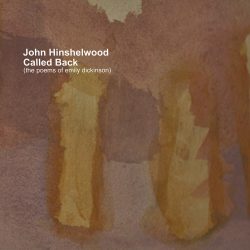The poems of Emily Dickinson find fine musical accompaniment in the hands of John Hinshelwood and his musical collaborators.
 Setting the words of poems to music can be challenging–while bespoke lyrics may often be poetic, many poems are ill-suited to musical interpretation–to paraphrase Oscar Hammerstein, “if it don’t sing it ain’t a song”. Happily, John Hinshelwood’s latest album ‘Called Back (The Poems of Emily Dickinson’, his sixth, rises to the challenge. Dickinson was a prolific poet, having penned some 1800 poems at the time of her death in 1886, although the vast majority were only published posthumously. Hinshelwood’s selections are well made, allowing her words to be fitted naturally to familiar musical forms, sometimes using a bridge to add structure, and neither the presence nor absence of rhyming models distracts the listener from taking in both the beauty of her words, and the subtle and varied accompaniments added by Hinshelwood and his excellent featured musicians.
Setting the words of poems to music can be challenging–while bespoke lyrics may often be poetic, many poems are ill-suited to musical interpretation–to paraphrase Oscar Hammerstein, “if it don’t sing it ain’t a song”. Happily, John Hinshelwood’s latest album ‘Called Back (The Poems of Emily Dickinson’, his sixth, rises to the challenge. Dickinson was a prolific poet, having penned some 1800 poems at the time of her death in 1886, although the vast majority were only published posthumously. Hinshelwood’s selections are well made, allowing her words to be fitted naturally to familiar musical forms, sometimes using a bridge to add structure, and neither the presence nor absence of rhyming models distracts the listener from taking in both the beauty of her words, and the subtle and varied accompaniments added by Hinshelwood and his excellent featured musicians.
Hinshelwood hails from Scotland, the musicians assembled by him for the project include members of his band Tim Black on guitar, Ed McGlone on bass, Frank McHugh on drums, Steve Forman on percussion, and Barbara Nesbitt and Mairi Orr on vocals. Other featured musicians include Dave Currie on dobro, Catherine Craig on vocals, Colin MacFarlane, credited as multi-instrumentalist, Jeri Foreman on fiddle, Laura-Beth Salter on mandolin, David Bowden on double bass, James Steele on tenor sax, and Alex Sharples on trumpet.
The album opens with an instrumental, the first of three on the release, ‘Let it Breathe’, its sparse acoustic guitar, mandolin and dobro arrangement having an old-time feel summoning up a gentler era long gone. This vibe continues through the album, most songs at mid tempo, with the fuller band arrangements still maintaining a relaxed, often dreamlike feel, allowing the words to shine through, often with female vocals adding harmonies to refrains, or to emphasise key lines. The other two instrumental tracks follow at what on a vinyl release would be the opening track of side two, and at the end of the album, the title track, ‘Called Back’, being the inscription on Dickinsons’ headstone.
A variety of musical styles are matched to Dickinsons’ poems, ranging from old-time again on ‘Judgement Day’, with its prominent fiddle and mandolin, to a more Celtic vibe on ‘Beauty and Truth’, while on ‘The Winds Visit’ there are echoes of John Martyn. Trumpet features prominently on this track, and on ‘Murmur’, ‘The Return’, and ‘Home’, while sax features on ‘To See Her’ and again on ‘Murmur’, adding a jazz tinge to these tracks.
Adding further musical variety is ‘Hunger’, with a distinct hint of Dire Straits in the melodic electric guitar motif, while ‘The Sun’ has a bucolic feel, with a gentle acoustic guitar melody, and the repeated refrain “that must have been the sun”.
The strongest Americana influences are heard where dobro and mandolin come together on ‘Goblin Bee’, and closing track ‘Called Back’, where the dobro takes a melodic lead, alongside Hinshelwood’s acoustic guitar and Foreman’s fiddle to great effect.
A fine tribute to the work of one of America’s leading poets, allied to musicianship of the highest quality makes this a rewarding listen.


